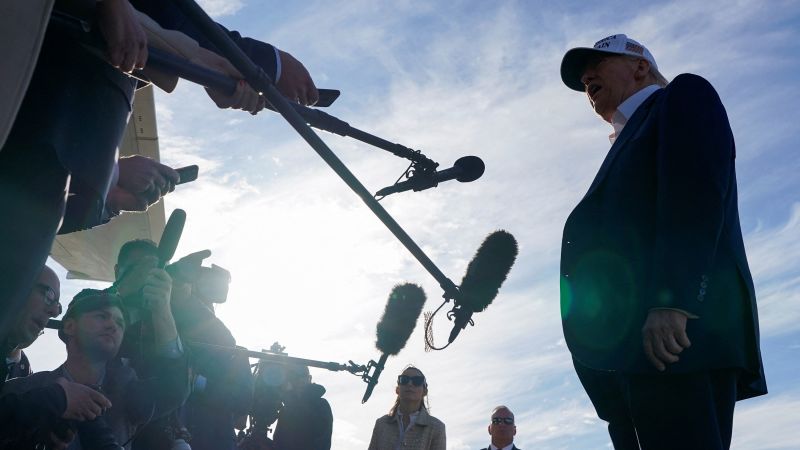On a recent Sunday, President Donald Trump announced a significant development regarding U.S.-European Union trade relations. Following what he described as a “very nice call” with Ursula von der Leyen, the President of the European Commission, Trump conveyed that he has agreed to grant the European Union an extension on tariffs until July 9. This decision stems from a desire to engage in serious negotiations surrounding ongoing trade discussions.
During his remarks to reporters at Morristown Municipal Airport in New Jersey, Trump elaborated on his conversation with von der Leyen. He noted her emphasis on the importance of getting down to serious negotiations on trade matters. “July 9 would be the day, that was the date she requested. Could we move it from June 1 to July 9? I agreed to do that,” he stated, indicating a willingness to accommodate the request in hopes of facilitating productive discussions.
In his address, Trump mentioned the intention to “rapidly get together to see if we can work something out,” highlighting the urgency and significance he places on resolving trade issues between the U.S. and the EU. Initially, Trump had planned to impose a substantial 50% tariff on European goods starting June 1, following an earlier decision in April that instituted a reciprocal 20% tariff on similar goods from the EU. The adjustment in timing reflects a shift toward diplomacy rather than immediate economic escalation.
Having just concluded his statement to the media, Trump took to Truth Social, where he expressed optimism for the discussions ahead. “Talks will begin rapidly,” he posted, suggesting an eagerness on both sides to engage in dialogue that could pave the way for an agreement facilitating trade benefits.
Earlier in the day, Ursula von der Leyen had shared her perspective on their conversation via X, the platform previously known as Twitter. She characterized the call as productive, noting that cooperation between the EU and the U.S. represents “the world’s most consequential and close trade relationship.” Von der Leyen emphasized that in order to reach a mutually beneficial agreement, time until July 9 is necessary to advance discussions swiftly and decisively.
Trump’s administration has frequently criticized what the President refers to as “non-monetary trade barriers.” He has expressed concerns over countries or trading blocs that create trade imbalances with the United States, which occur when American purchases from foreign markets outpace their purchases of American goods. This particular issue has been a focal point of Trump’s trade policy.
The U.S. recorded a substantial trade deficit with the EU, amounting to $236 billion in the previous year, as reported by the U.S. Commerce Department. Such figures underpin Trump’s consistent argumentation supporting the necessity for renegotiating trade treaties to ensure fair practices and bolster American economic interests.
The backdrop of these discussions represents a broader context of fluctuating trade dynamics between the U.S. and its global partners. The ongoing negotiations and decisions surrounding tariffs have implications not just for bilateral trade relationships but also for the broader economic landscape.
As both sides gear up for potential discussions aimed at resolving trade disputes, the extension provided by Trump could lead to negotiations that may ultimately reshape the terms of trade between the world’s two largest economies. Allowing until July 9 for further dialogue reflects an understanding that trade policies directly impact millions of jobs and the economic stability of both regions.
In conclusion, Trump’s willingness to engage in extended negotiations underscores the importance of diplomatic dialogue in potentially rectifying trade discrepancies and reconciling interests that benefit both the U.S. and the EU. The conversation surrounding tariffs and trade conditions is poised to evolve, with both leaders signaling a readiness to tackle the intricate web of trade relations, with the goal of achieving a mutually advantageous resolution.



